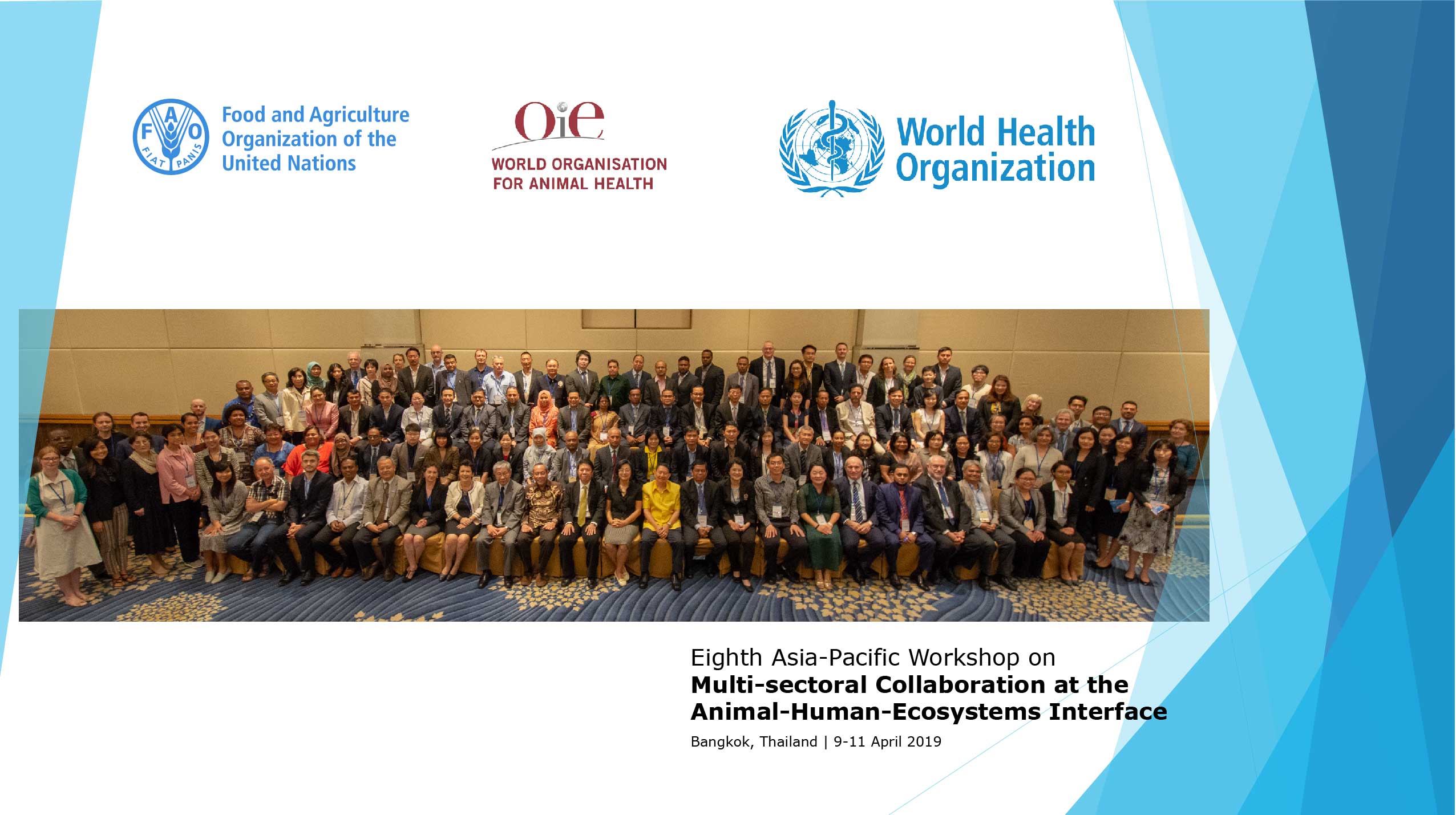


The 8th Asia-Pacific Workshop on Multi-sectoral Collaboration at the Animal-Human-Ecosystems Interface was organised under a Tripartite collaboration mechanism led by the FAO Regional Office for Asia and the Pacific in Bangkok, Thailand from 9 to 11 April 2019. The main objectives of the meeting were to: provide an update of emerging and re-emerging zoonotic diseases and other public health threats (including zoonotic influenza, rabies and AMR) at global, regional and country levels; review progress made and challenges encountered in terms of multi-sectoral coordination, including information sharing, coordinated response and risk reduction, at regional and country levels; make recommendations on further improved coordinated action at animal-human-ecosystems interfaces among different sectors.
A total of 142 participants attended the workshop, including representatives from 28 countries in the Asia-Pacific region. The welcome and opening remarks were delivered by representatives from the FAO (Xiangjun Yao, Regional Programme Leader), OIE (Ronello Abila, Sub-Regional Representative), WHO SEARO (Tjandra Aditama, Acting Director, Department of Communicable Diseases) and officials from The Government of Thailand (Cheerasak Pipatongsopon, Deputy Director General of the Department of Livestock Development, and Suwannachai Wattanayingcharoenchai, Director General of the Department of Disease Control).
Day one sessions began with presentations from external experts on One Health and multi-sectoral collaboration. The keynote speech was given by Joseph Annelli (Practical One Health Solutions, LLC) on how to operationalise One Health activities. To highlight recent progress within the region, updates on the Regional Tripartite’s three flagship topics were discussed: rabies, zoonotic influenza and AMR actions. Presentations from the Tripartite members and country representatives outlined regional activities, in particular progress made following recommendations made at the 7th Workshop held in Manila, the Philippines, in 2017. The region continues to face challenges from diseases such as rabies, with an ongoing outbreak in Sarawak, Indonesia.
Countries submitted both questionnaires and posters to summarise their situations. The “world café” format was used to discuss the country poster presentations, focusing on One Health activities. Rabies and avian influenza still top the zoonotic diseases reported in the region, with challenges cited including a lack of high-level advocacy, lack of surveillance and diagnosis, and funding and infrastructure deficiencies. Key steps forward include the use of joint risk assessments and other tools to help prepare countries for disease outbreaks, and multi-sectoral coordination activities incorporating information sharing and joint training exercises across sectors.
Day two included a synopsis of many of the tools available to aid multi-sectoral collaborations in disease management. In particular, the “Tripartite Guide to Addressing Zoonotic Diseases in Countries” has been recently published and is available online (https://www.oie.int/fileadmin/Home/eng/Media_Center/docs/EN_TripartiteZoonosesGuide_webversion.pdf#search=’Tripartite+Guide+to+Addressing+Zoonotic+Diseases+in+Countries’). Tools described included: joint risk assessment (JRA), IHR-PVS National Bridging Workshops, JEE, the SARE tool for rabies, OH-SMART and OH APP. Ongoing collaborations such as OFFLU, GHSA and rabies “Zero by 30” were discussed. The theme then shifted to focus on antimicrobial resistance (AMR), with country examples of recent progress in Japan, Bangladesh and Thailand. Recent disease outbreaks were used to show the usefulness of One Health mechanisms – for example rabies in Malaysia and Nipah virus in India. Presenters from Chatham House (The Royal Institute of International Affairs) described lessons learned in hazard identification and risk assessment, management and communication during a BSE outbreak in the UK.
A second “world café” was held to discuss incentives for multi-sectoral collaboration, major constraints faced, and how to learn from issues. Constraints generally relate to low awareness, weak political commitment and a lack of sustainable funding. Challenges faced also include natural disasters, climate change, public-private partnerships and chemical spillages. Although communication can still be an issue, in many situations there were examples of international mechanisms covering several areas.
On day three, the first session described many experiences engaging multiple sectors, including academia, immigration and wildlife. Of note, a representative from the Pacific Community talked about specific risks for that region – biodiversity loss, climate change and land use change. Following on from that, neglected or novel diseases were discussed – including parasitic zoonoses (in the region), trichinellosis (in Cambodia) and Schmallenberg virus (in the UK).
During the final summary session, participants used online voting to select important proposed recommendations. It was announced that the next workshop will be organised by the OIE (joint RRAP/SSR) in 2021.

